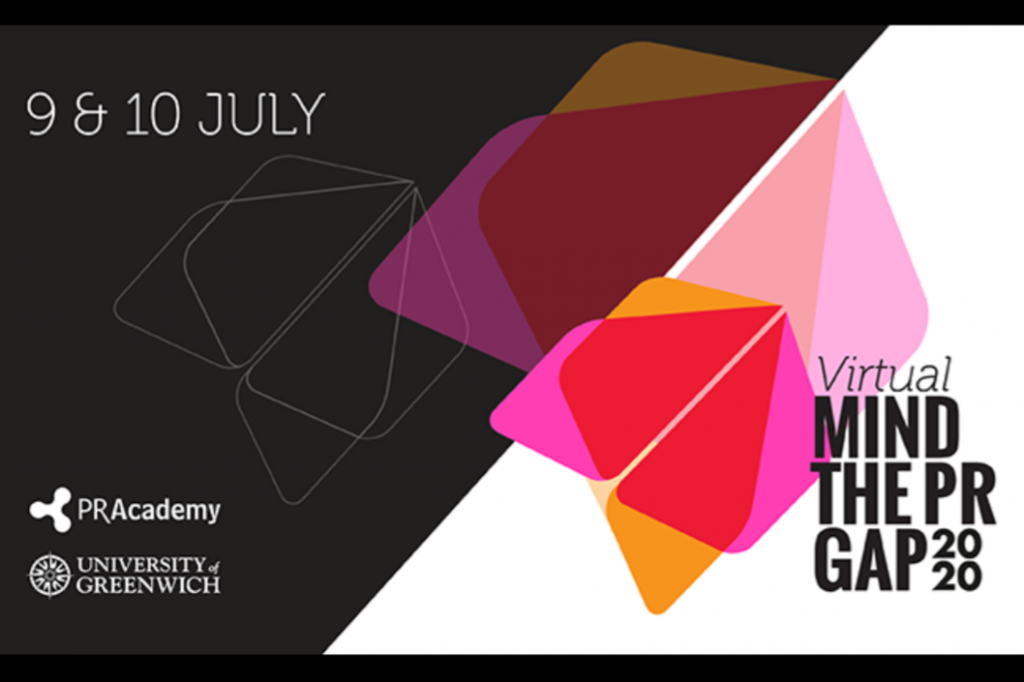Sign up for virtual Mind The PR Gap 2020
Free online conference addressing technology and the future of work runs next week

About the author
Richard Bailey Hon FCIPR is editor of PR Academy's PR Place Insights. He teaches and assesses undergraduate, postgraduate and professional students.

Online meetings; online classes; online conferences. We’ve become familiar with Zoom, Teams, Meet, Skype, even Houseparty over the past few months. Yet which formats have worked for you? What’s the best balance between information and engagement?
Some have gone long, designing events running for a week. Others have turned a one-day event into two days of streamed talks. Some have focused on live presentations and discussions, others have relied on recorded talks.
Then there’s the question of cost. I’ve paid to attend online events and I’ve signed up to free events. None of them is truly free as you’re committing your time – though the saving in travel and accommodation has already been appreciable this summer.
Think of Bledcom, taking place this week. This has always seemed to me the most exclusive of academic conferences because of its relative inaccessibility in rural Slovenia, but also because of the quality of the conversations. Well, it couldn’t be any more inclusive than this year now that it’s being streamed online – and for free. Bledcom opens tomorrow.
At PR Academy, we’d been planning a one day Mind The PR Gap conference to be held at the University of Greenwich. We chose a Saturday as it would make it easier for those in full-time jobs to attend (though some might find it easier to gain cover at work than at home). Then, as with every other event since April, we’ve had to rethink the plans.
Our one-day event in collaboration with University of Greenwich has now been split into three sessions running on two days next week – but with a 90-minute time limit on each session.
Registration is free, but you need to sign up for each session separately.
Our themes have been chosen to help us think ahead, and also to think outside the compartments of public relations or internal communication.
So, we’re gaining scholarly insight into empathic technologies and considering the implication of machines that can sense and invoke emotion. What are the implications for our professional practice, and for trust and the question of fake news? That’s an outline of the first day’s session.
The second session looks to the future of work and careers, with perspectives from academics, practitioners and professional associations.
The closing session is a networking session over virtual drinks to include some quiz questions set by PR Week editor John Harrington.
Our approach to an online conference is to go short – and to make it as accessible as possible. I hope to see you next week. Details of the sessions – with registration links – follow.
AI, creativity and fake news in a post Covid-19 world
Date and time: Thursday 9 July 12noon to 1.30pm
Keynote speakers: Professor Andrew McStay and Professor Vian Bakir (both at Bangor University)
Panellists: Kevin Read (Pembroke and Rye), Stuart Youngs (Texture AI), Stuart Bruce, Vian Bakir and Andrew McStay, co-chaired by Philip Young (Birmingham City University) and Ann Longley (Something New Together)
The future of work, careers and learning in a post Covid-19 world
Date and time: Friday 10 July 12noon to 1.30pm
Keynote speakers: Satyen Dayal (Edelman), Dr Heather Yaxley (Applause Consultancy and Knowledge Management Consultant at CIPR) and Dr Sarah Roberts-Bowman (Northumbria University)
Panellists: Satyen Dayal, Heather Yaxley, Sarah Roberts-Bowman, Jon Gerlis (CIPR) and Steve Miller (PRCA) co-chaired by Richard Bailey (Leeds Beckett Univesity and PR Academy Insights) and Dr Nicky Garsten (University of Greenwich)
Virtual drinks, networking and PR quiz
Date and time: Friday 10 July 5pm to 6.30pm